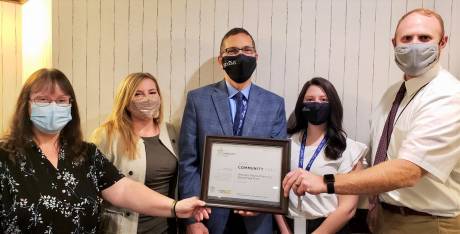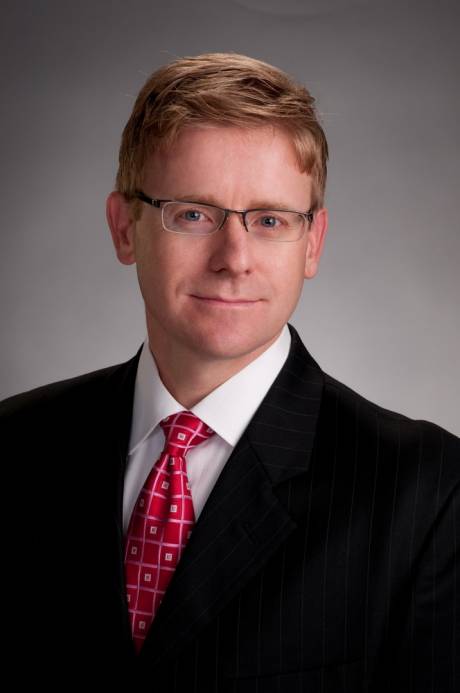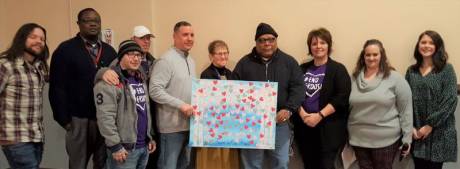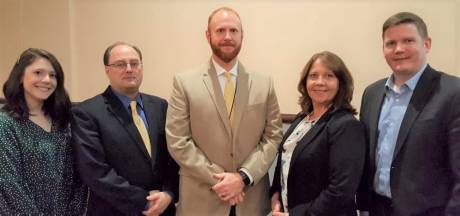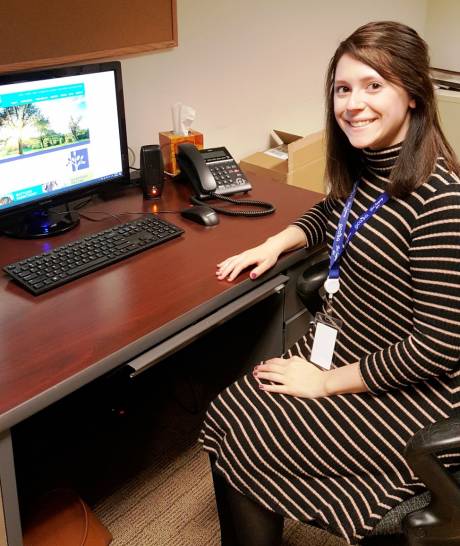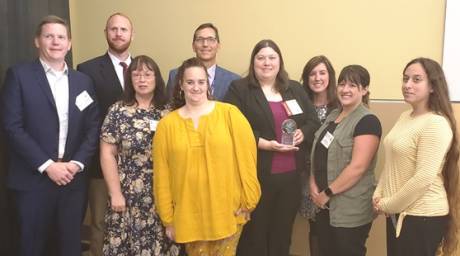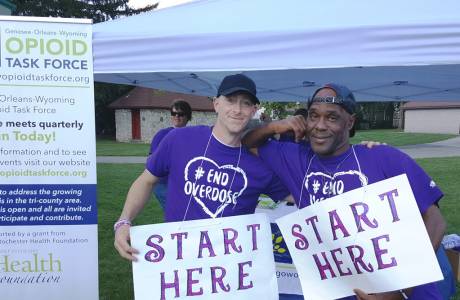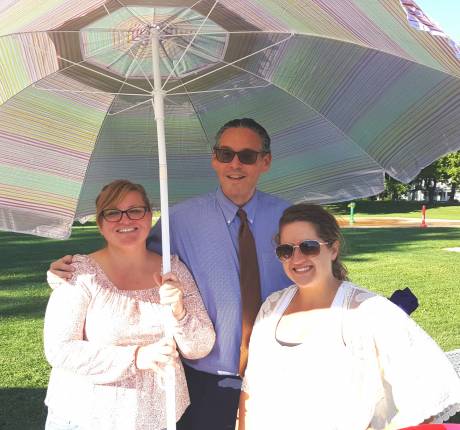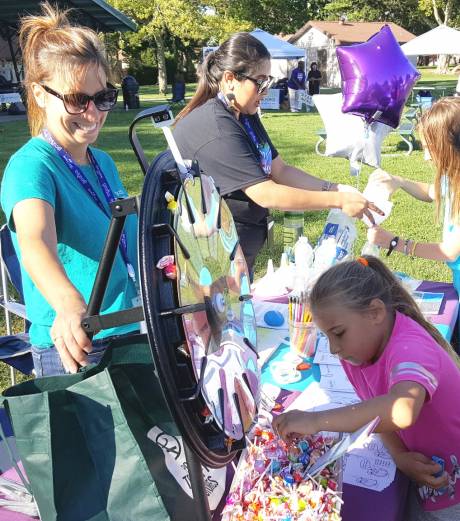On a national level, the number of deaths from opioid overdoses has decreased over the past two years, but that trend doesn’t give the nearly 450 members of the GOW Opioid Task Force any reason to relax their efforts in Genesee, Orleans and Wyoming counties.
That was the message communicated by the coalition’s leaders on Wednesday during their quarterly meeting at the Quality Inn & Suites on Park Road in Batavia. About 100 people representing a cross-section of organizations from the three counties attended.
“We’ve seen a 5 percent decrease from 2017 (in the number of opioid-related deaths) and that’s a positive thing … but we need to stay the course, even if the numbers are going down,” said Paul Pettit, public health director of Genesee and Orleans counties.
Pettit’s statement is especially true when considering the data from the GOW counties, particularly Genesee, which had an opioid overdose death rate of 36.2 per 100,000 people in 2017 – one of the highest in the United States.
That number went down to 21.1 in 2018, but in Orleans County the rate rose from 17.1 to 29.5 from 2017 to 2018 while in Wyoming County the rate stayed the same at 27.
The opioid epidemic started due to physicians’ overprescribing drugs such as Oxycodone, Pettit said, and evolved into serious problems with heroin and fentanyl after laws were passed that restricted access to the prescription drugs.
Drug overdoses resulted in nearly 800,000 deaths to Americans from 1999 through 2018, including 47,590 from opioids in 2018 alone, Pettit reported.
Pettit applauded the work of the GOW Task Force which has taken on the crisis by pooling the resources of the three counties and developing six “work groups” that meet on a regular basis – Access to Care, Community Education, Data, Family/Loved Ones/Allies, Law Enforcement and Naloxone.
He also noted the significance of funding provided by the Greater Rochester Health Foundation.
“The funding is very important in that it enabled the task force to hire someone (a project coordinator) with a dedicated focus,” he said. “They see the value in what we are doing.”
The meeting also featured reports from the chairpersons of the work groups and task force evaluators, updates from the GRHF President Matthew Kuhlenbeck and GOW Task Force Coordinator Christen Ferraro, and a summation of the state’s new bail reform law by Wyoming County District Attorney Donald O’Geen (see story below).
Access to Care – John Bennett and Rosalie Mangino-Crandall, executive director and project director, respectively, at Genesee/Orleans Council on Alcoholism and Substance Abuse and Holli Gass, clinic director at Spectrum Health and Human Services, outlined the numerous services and programs that have been instituted in all three counties – programs such as expanded jail services, childcare for patients, crisis housing and certified peer recovery advocate training.
Bennett also said that a 16-bed detox center and recovery recreation center in Batavia and a 25-bed women’s and children’s residence in Albion are on the horizon (with the recovery center at the former Bohn’s Restaurant expected to open by the end of February).
Community Education – Sherri Bensley, a GCASA employee, explained the role of this work group is to facilitate the task force meetings, including setting up venues, speakers and vendor tables, and to coordinate media campaigns with the three county’s hospitals.
Specific ongoing projects are educating the senior population about opioids and the handling of prescription medications and assisting the task force in distributing “Dispose Rx” packets.
Data – Brenden Bedard, Genesee County director of community health services and deputy public health director for Genesee and Orleans counties, said the role of the evaluators is to ensure that task force initiatives are data-driven, to get that data to the community and to use the data to support grant applications.
In addition to the county overdose death rates mentioned above, he reported that there were 23 opioid overdose deaths in the three counties in 2019 – down from 38 the previous year – and that Naloxone (Narcan) administration – given to those who are overdosing from opioids -- has decreased in all three counties since 2017.
Bedard also said that more than 2,000 pounds of prescription drugs were collected during “take back days” in both 2018 and 2019.
Families, Loved Ones and Allies – Sue Gagne, coordinator of the Recovery WOW program, said that the goal of her work group is to support families of those in active addiction or recovery and families of those who have died as a result of drug use.
She reported that the group plans another Overdose Awareness Day this summer at Austin Park.
Law Enforcement – Batavia City Police Chief Shawn Heubusch touted the tri-county law enforcement collaboration on projects such as drug drop-off and jail programs, and participation in the Police Assisted Addiction and Recovery Initiative that creates non-arrest pathways to treatment and recovery.
Naloxone – Chairperson Charlotte Crawford reported that more than 1,300 people have been trained in the use of Narcan, including all of the peer recovery advocates.
A video, “Narcan After Care,” can be viewed on the GOW Opioid Task Force website at https://www.gowopioidtaskforce.org/.
Tom LaPorte, Ph.D., research scientist with the Center for Human Services Research, University of Albany, said that evaluation objectives include reaching 1,800 users per year with opioid information, deploying peers or recovery coaches to assist 90 percent of opioid patients and increasing the number of people trained to administer Narcan by 500 per year.
“This provides us with useful feedback that providers of services can use for data-driven decision-making,” he reported.
In closing, Kuhlenbeck and Ferraro spoke of the importance of making sure grants were available for programs in rural counties, and set goals as follows:
-- Establish and implement policies and protocols at United Memorial Medical Center, Orleans Community Health/Medina Memorial Hospital, and for contacting Peers/Wyoming County Community Health System Recovery Coaches on call every time a person arrives at the emergency department due to opioid use.
-- Establish a three-prong approach: peers called, bridge scripts are given, and naloxone training is provided.
-- Schedule and conduct doctor-to-doctor trainings and conversations in each county on opioids, non-opioid pain management alternatives, and limiting opioid prescription writing.
-- Conduct at least two community education events around non-opioid pain management alternatives, and create and publish two press releases or news articles on non-opioid pain management alternatives.
-- Communicate with Buffalo and Rochester hospitals to share policy best practices and advocate for and locally lead action toward improvements.
The next quarterly meeting of the GOW Task Force is scheduled for April 23 at a site to be determined.
Photo above: Taking part in Wednesday's GOW Opioid Task Force meeting were, from left, Christen Ferraro, task force coordinator; Donald O'Geen, Wyoming County district attorney; Paul Pettit, public health director of Genesee and Orleans counties; Laura Paolucci, Wyoming County public health administrator, and Matthew Kuhlenbeck, Greater Rochester Health Foundation president.
Disclosure: Story written by Mike Pettinella, GCASA publicist.

